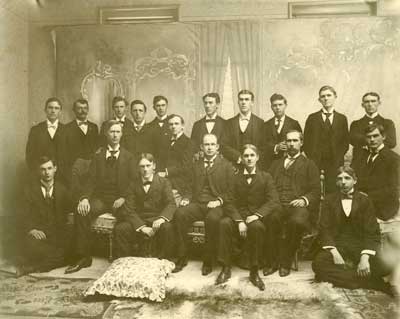
The 9019 had strict requirements for initiation and only the top students of the junior and senior classes were admitted. The requirements were that the applicant must pass a mid-year exam of the Junior Class at Trinity or at some other college of good reputation, have an excellent moral character, be a regular student of Trinity College, and maintain a scholastic average equivalent to a grade point average of 90 percent.
The Society's constitution gave its official name as the 9019, but did not specify what the numbers signify. One legend says that the group was named 9019 because nineteen qualifying members had averages of above ninety.
The 9019 had a visible presence on campus. The Society sponsored numerous educational programs, student/faculty forums, and luncheons. In 1902, the 9019 established the South Atlantic Quarterly. The journal consisted of articles written about current events and was devoted to the "literary, historical and social development of the South." Bassett felt that offering young writers the chance to read good original works by established authors would help them develop proper literary skills. The 9019 also organized many social functions such as banquets, picnics, dances, reunions, and anniversaries.
The 9019 extended its involvement into the community. In 1910, the 9019 began sponsoring an annual Declamation Contest for high school students. The Society wanted to encourage high school students to develop an interest in literature and increase their knowledge of literary classics. The Declamation Contest was held on the Friday following Thanksgiving. Young men were sent to compete in public speaking performances. Each participant would choose a literary work and read it aloud in front of three or four judges. The winner of the contest received a gold medal, valued at $20.00. These contests continued until the outbreak of World War I.
A number of events led to the diminishing importance of the 9019. World War I interrupted the Declamation Contest and no new projects were launched in the community. The formation of a Phi Beta Kappa chapter at Trinity College, on March 29, 1920, also affected the importance of the 9019. As a national honorary society, membership in Phi Beta Kappa provided more prestige than the 9019, a local society. From 1920, until the end of its existence in 1943, the 9019 became an honor society solely for the junior class. As Duke University developed, students had the opportunity to join professional societies in math, engineering, medicine, and law. Fraternities and sororities also expanded. The 9019 no longer offered its members the programs or the prestige that it did in its early years. World War II brought an end to the 9019.
John Spencer Bassett formed the 9019 to inspire and recognize students' involvement in academic and community life. As the first honor society at Trinity College, the 9019 provided students with opportunities to be part of an intellectual society that encouraged educational advancement.
Related Resources
- South Atlantic Quarterly. Durham: Duke University Press, 1902-ongoing (catalog record) (digitized issues available via HathiTrust)
- Society of the 9019 Records, 1892-1943 (collection guide)

